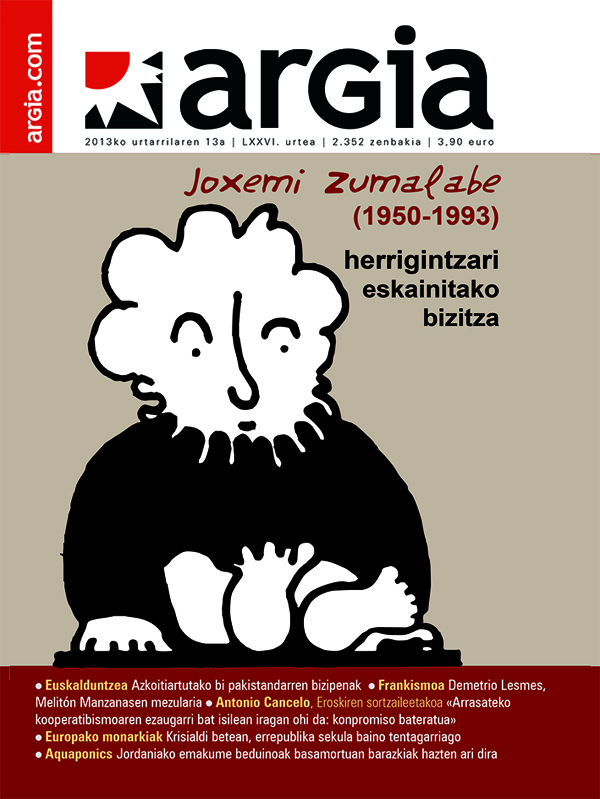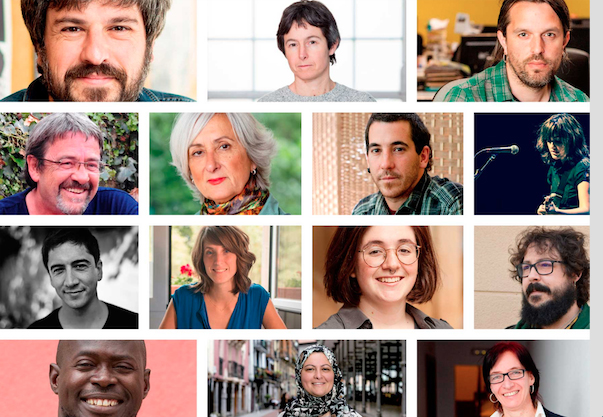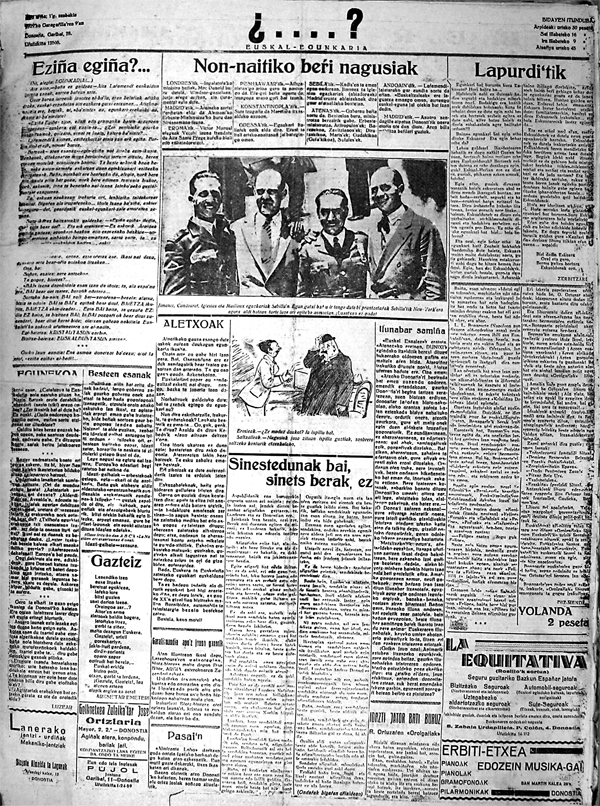"Despite having few resources, we've always been ambitious."
- He is not just anybody in ARGIA Joxemari Ostolaza (Donostia, 1948). Since 1978 he entered the Clear Sky, that of the Capuchins, and soon after he was bought by the workers of the company in a precarious situation, he has witnessed and part of the journey to this day. He spoke to us without hair in his mouth. We have talked with him about militancy and equality, about ARGIA and herrigintza.
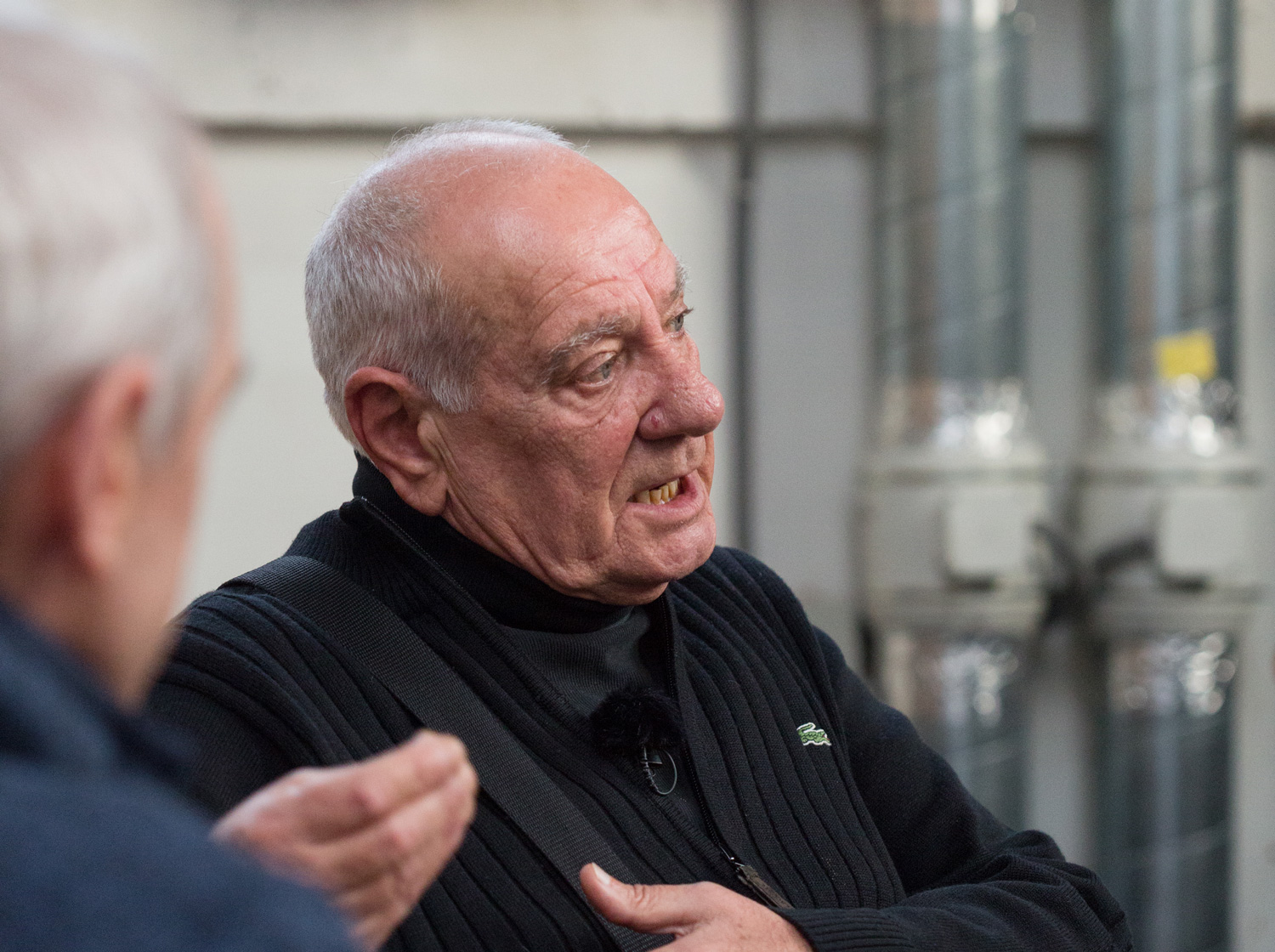
What was your environment like when I was young?
Apart from the parents, all the Basques we knew were for us, in pejorative terms. I was then very modern, so by the time I turned 9, I totally lost Euskera. For 14 years, we were the first rock band, and of course, we were doing it in Spanish and in bad French. It was about it not being Basque. We had a lot of embarrassment, especially with my father. He didn't know Spanish well and was indifferent to him. I was a born erdaldun until I was 18.
What was the environment like in the 1960s?
We lived in the Egia district of Donostia. In addition to doing sports, we had the music group Los Paxai. Ez Dok was Amairu's founding portal. We won several championships, including the one organized by Radio Nacional de España. We were also Rafael's teloneros in 1965. Then, the radical rupture of this way of life gave rise to two elements: ETA and Ez Dok Amairu We had a contract to sing in Mexico and I said: “I’m not going to sing anymore in Spanish, out.” I discovered the Basque again and began to want to be radically Euskaldun.
What did Ez Dok Amairu and ETA bring to light?
Illusion and emotional connection with parents, grandparents, grandmothers, etc. The challenge was also interesting: we set up a night school in the neighborhood between four cats, and then we started to unveil the idea of the ikastola Aitor.
At the age of 30, he entered Celestial Light in 1978. What did you see?
For me, everything is one. Singing in Euskera or the work we do with young people around football as well. These are elements that are within a project. The Whale Bactrian came to Ziburu and proposed to enter the Glow of Heaven. So I was on the other side, I was struggling to come. The moment Egin and Deia were created, the Light of Heaven was empty. Pilar Iparragire, Elixabete Garmendia, Jose Luis Alustiza, Lourdes Auzmendi and Karlos Astrain stayed in Rotu magazine and there I met them.

What was the picture?
It had no economic viability. They said that we sold 12,000 copies, but they didn't: they printed, but they didn't charge 6,000. The advertising was also carried out by the newly created Egin and Deia, and then the newspapers began to extract the supplements in Basque, Berriak, Punto and Hori and Garaia did us a lot of damage. I couldn't go on like that. We endured it for over a year, until the breakup came. The Capuchins rejected the hole we were creating, although now looking at the economic hole wasn't that big. However, that had no future.
Did the Capuchins have any discrepancies with their line?
Yes. Very few people agreed with us. Unintentionally, we became very alternative. We were young and wanted to be progressive. In dealing with the issues, for example, homosexuality, from whatever side you want, our views were not well seen in that ever-present Basque world. Pilar Iparragirre, for example, had to hear great criticism of an article. “Urdanga” and things like that, it’s written.
The process of preparing the journal began to delve into you.
The technical process is important. There were still no computers, just monsters. I wasn't able to film the text. We started by looking for a supplier in the neighborhood of Egia. Joxemi Zumalabe and Jon Barandiaran Barandi worked there. I proposed to come to us and do our job at the other company. But the Capuchins didn't want to go on and they had a proposal.
From whom?
“We had a lot of money in the company us, our friends, our family... and not the Capuchins. Therefore, we recognized all the legitimacy to accept it.”
Of Oñati, of Mimentza and of those who made Goizargi. We could not accept it and we used our strategy: we believe it was ours and not that of the Capuchins. We were the workers there, the ones who generated the debt but managed it. In addition, by then we had already entered a lot of money into the company, us, our friends, our family... and not the Capuchins. We therefore recognized ourselves absolutely legitimate to accept it. In the end, they didn't give us the slogan Zeruko Argia, they gave us LUZ, a second stroller. The treatment was as follows: That if no one pulled the Light out of Heaven in 10 years, no one could do it later. At the same time, we managed to get the name of our company to be Zeruko Argia. It was a complicated time. Then came Josu Landa, Pello Zubiria, Iñaki Uria and the time they entered. And these, they made LIGHT.
What values were you working on?
Today's ones. I now read your demands as a subscriber and I see that it is then. Especially how you present the campaigns, and conceptually they are the same: nationality and independence.
Independent journalism requires political and economic independence. Also have economic activity.
We knew we had to be independent, we wanted to be independent, and so we have to fund ourselves. That has not changed.
We have where to look. Did you have it?
We also had referents. By then we had already learned Marxism, we had Vietnam, Algeria, Cuba, the workers’ cures ... As for ideologization, the environment was very rich. However, I once believed that we were a minority and now I realize that we have been an anecdote. Necessary, but anecdote. This town is Telecinco.
You contributed especially, giving an entrepreneurial environment to this structure that would function entirely in Basque.
If we had started to claim salaries, social security, etc., we would not have been able to last for a year. Companies had to be created not only to provide economic support to ARGIA, but to create an environment for this activity. It needed a lot of complicity. I think that was achieved. Today we have turned here [it has come to the headquarters of ARGIA and the printing press Antza] and I see some complicities, and that is not suddenly created. Pavilions and these machines are things that are made from the benefits of daily activity. Everything has been done as the logic demanded. In our head, there were no workers there, there were partners. That was the goal, but the way to do it has been very long. For example, ARGIA has achieved that, you are partners almost all workers. It has not been so easy, however, as we have had a bit of crisis.
.jpg)
What role was ARGIA playing in the 1980s?
We thought we were doing what this society needed. And I think that's where we've been right. Despite having few resources, we have always been ambitious. We were doing interviews that nobody does. In music, I do the same thing that I want to hear. We didn't hold meetings to decide what our ideology was, and so on. We lived together every day, we knew each other, and in this country things have always been quite clear. Well, now not so much.
They were so ambitious that, in addition to doing the weekly, they began to create Euskaldunon Egunkaria. What did you do?
Everything had to be done. Political work, going to Gasteiz, talking to one another, collecting, writing, attending meetings... Fewer than half a dozen subcontractors could not be structured. Implicitly, everyone knew what we corresponded to for, but the work was there and it was done. We've always been touched by the work of ambassador, because you have to explain the evidence, because you realize the evidence isn't clear. With the newspaper we had to defend that the Basques and Euskera had the right to have a newspaper. That is what he has touched on. Today it is also up to us to defend it beyond our world.
Would I highlight something?
Those who wanted to collaborate with the project put the money into a bank and why didn't they ask for their name? Because this long management had already been carried out. There was one entity that approved it, one in six. And then, in the arrest of these [looking at Pello Zubiria], you realize it was decisive, because they wanted names. The Spanish press said: “It’s not possible to believe that there have been people without more money.” It was decisive to be able to make contributions without giving a name. Somebody put a lot of money in.
When you created Euskaldunon Egunkaria, you were looking for locals and, if I am not mistaken, some families set up money to be able to take them.
They're anecdotes. But first you have to give four names that helped get the LIGHT out of a hole: Modisto Santi Auzmendi, Iriondo de La Casa del Café, Aparejador Enparanza and Luis Bandrés de Elhuyar. To get to the newspaper, you had to go through that hole. And that, at one point, was decisive. The family was an anecdote, but not, because they had no children in this project.
In a report on the 25th anniversary of the creation of Euskaldunon Egunkaria, you said that at that time the Basque was the main axis, that you worked in the national construction with a left-wing vision and practice. It was the engine. Would you go deeper?
If I mention feminism, for me to be a feminist, you have to be left-wing. That is, a way to build the world and society in which the world is a world without resources that no one can dominate. If the Basques were colonizers, I would be against the Basques, if it were left, it would not be left. So, I've been touched by being the son of the oppressed -- and when I was 18, I started to accept that evidence. And in connection with similar ones. For me it cannot be left without Euskaldunize in the Basque Country. It is a terrible contradiction.
What is the importance of militancy in Basque culture?
The most basic. If you choose Euskera in your creative activity, you have chosen to work in the language of a minority and you must be consistent. You know you won't be able to live from direct selling like French and Castilian speakers. You can't think you'll sell 100,000 books. Music is another witch. But he is aware that you want to speak in Basque and therefore accept the conclusions. You need a very strong militancy to survive, or if not, live from subsidies.
How do you see the Basque world today?
I have very contradictory views and I know that I am nothing objective. I have people I like and I consume that. We are not standardised in this respect. That at my age is a burden. Durango, Durango, Durango, Durango -- and they start a month before Durango. You've made a book of poetry, and it's very important to publish it, although you'll only sell 60 copies and editorial spending will be fixed by buying 300 from institutions. That seems to me to be a fantasy. When Zumosol's cousin disappears, what will happen? Are we able to feed on what we do? It looks like it doesn't.
And how do you see the media ecosystem in Basque?
I don't know, but seen from the outside, I found the last cake you published scandalous. [On advertising distribution of the Basque Government with cover number 2623 of ARGIA]. I will say more: what I see and ask of the body is not to go against the donor, but against some recipients. For insolidarity. They are purely non-solidarity. And for me, that's the strongest element to play bankruptcy. We have the same flu, but you've been given it in the pharmacy and I'm not, it's not for me. That at least one self-organization is not there... We tried, but it didn't come out. Mr Gotzon Egia, of the Council of Gipuzkoa, testifies to this. “You decide what you have, we have criteria and we will distribute it among us” was philosophy. That's what militancy has to do with everything. Seeing this, “every one of yours”, I am clear that the political and ideological dependencies will come from there, if they have not already arrived. I'm not interested in what they do.
You've been writing columns here for many years every week. What is ARGIA for you?
House: old, renovated, with new people... but the house. For example, our children didn't know what to answer if the teacher asked them about their father's office. Once her daughter put "Argieroa." He needs to be asked what it was like to be “Argiero” at the age of 15-16. After all, it's the content you give your life, ARGIA has played, but Hernani's football team can also ask and the same. There I've spent my whole life giving the best I've ever been able.

How do you see the current LIGHT?
All right. On the one hand, I see the facilities, and that's what we wanted. And then, I see you grounded, every day I receive the newsletter in the e-mail and then the weekly. Do you ask me what place it occupies? I don't know. I will also say to you with great displeasure that I do not know any ARGIA or Berria readers in my environment (music academy or football schools). This remains exactly the same. Demagogy can be done big, but that's there.
We've recently seen you at the Rikardo Arrangi Journalism Awards, on the stage, in the recognition we wanted to make to the generation that the current ARGIA team had. Can you tell me how he lived?
At first, surprise. I have and I have my opinion of the Rikardo Arrangi Awards. Then, reading the communications of friends, the joy of Christ. And then, I think, we made it clear that we were not standard. Neither you nor us. That ARGIA is not standard, because at our time of receiving the prize everything was different. We are continuing along the same lines. The prize is an anecdote, but there I saw some on the front line who had to swallow us, that we were up there, hostile, it gave me joy. Yeah, that's it.
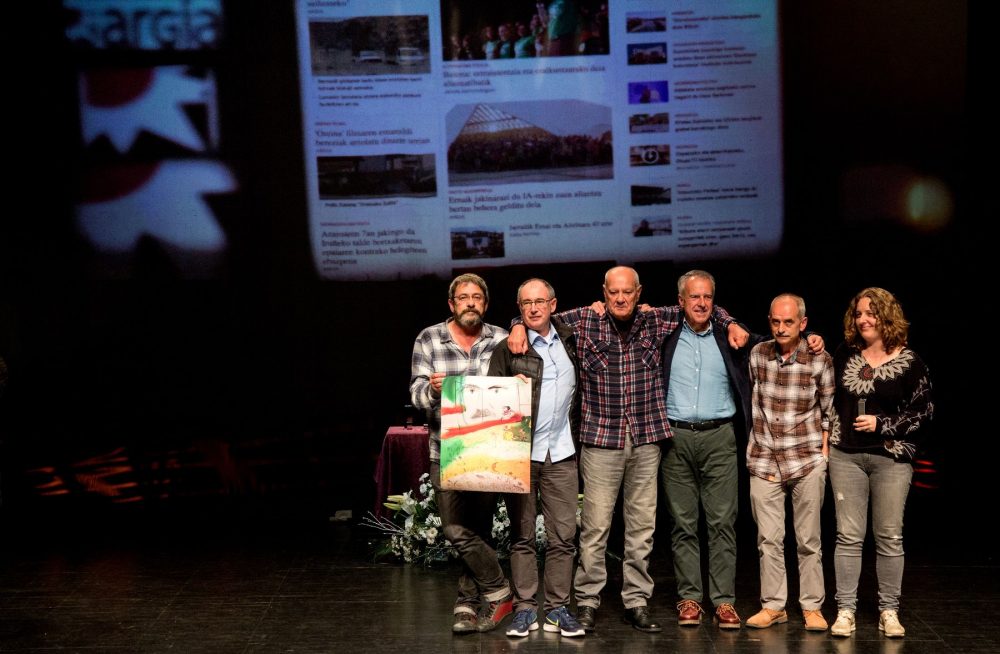
In the 30th edition of the Rikardo Arrangi Prize, "Ten milestones" were awarded, among which the "Zeruko Argia a ARGIA" award stands out. The current ARGIA work team dedicated the prize in particular to the first working group that was set up in 1980. Representatives of this group of workers rose to the stage, in memory of Joxemi Zumalabe, Josu Landa, Iñaki Uria, Joxemari Ostolaza and Pello Zubiria. Joxemari Zinkunegi, of Zinkunegi Optika, who has been advertising in ARGIA for 51 years, awarded the prize. This is the message that Estitxu Eizagirre read on behalf of the ARGIA working group: We do not forget that.
2019 has been a special year for ARGIA, an example of this is this number that you have in your hands. Turning a hundred years is not an easy achievement, even more so for a small media outlet in Basque. The celebrations have taken different forms throughout this year and, as... [+]
On the day of the presentation of book 111 Hostoz eta Orriz we had the opportunity to learn about the culture of Duzunaritz. A delicious day to round off a series of celebrations that fill the century of Argia. I can't imagine a more beautiful path than to dirty the shoes in... [+]


















